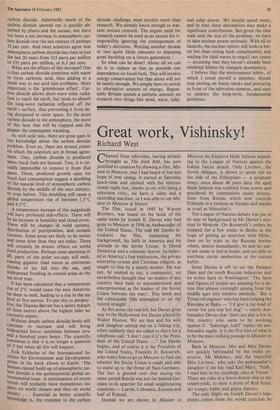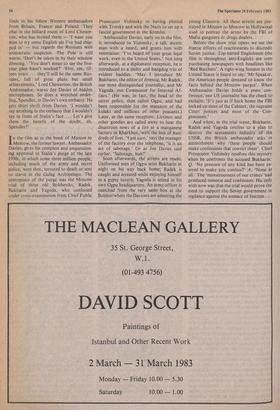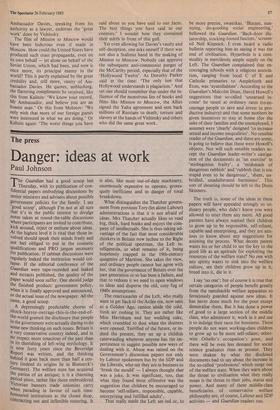Great work, Vishinsky!
Richard West
Channel Four television, having already ‘../brought us The Irish RM, has now justified its creation by showing a film, Mis- sion to Moscow, that I had heard of but lost hope of ever seeing. It started at Saturday lunch-time and clashed with the interna- tional rugby but, thanks to my wife being a television critic, we have a video and a recording machine, so I was able to see Mis- sion to Moscow at leisure.
The film, issued in 1943 by Warner Brothers, was based on the book of the same name by Joseph E. Davies who had gone to Moscow in 1936 as Ambassador of the United States. The real Mr Davies in- troduces the film, explaining his background, his faith in America and his attitude to the Soviet Union. A liberal Democrat and a company lawyer, he believ- ed in America's free institutions, the private enterprise system and Christian religion, as taught to him by a saintly mother. He was not, he wanted to say, a communist, yet nevertheless thought that 'no leaders of any country have been so misunderstood and misrepresented as the leaders of the Soviet Union between the wars'. This book and the consequent film attempted to set the record straight.
At this point the real-life Joe Davies gives way to the Hollywood Joe Davies played by Walter Huston. We see him and his wife and daughter setting out on a fishing trip, when suddenly they are called to shore for a telephone call. I don't care if it's the Presi- dent of the United States ...' Joe Davies begins, and of course it is the President of the United States, Franklin D. Roosevelt, who wants him to go to Moscow to find out whether the Soviet Union is ready and able to stand up to the threat of Nazi Germany. The fact is glossed over that during the same period Russia was not far behind Ger- many in its appetite for small neighbouring countries — Latvia, Lithuania, Estonia and half of Poland.
Instead we are shown in Mission to Moscow the Emperor Haile Selassie appeal- ing to the League of Nations against the Italian fascist attack. Only Litvinov, the Soviet delegate, is shown to speak out on the side of the Ethiopians — a poignant irony, since about 40 years later the aged Haile Selassie was tumbled from power and murdered by communists under instruc- tions from Russia, which now controls Ethiopia in a tyranny as foreign and maybe as cruel as Mussolini's.
The League of Nations debate was put in by way of background to Mr Davies's mis- sion to Moscow. On Roosevelt's orders he stopped for a few weeks in Berlin in the hope of getting an interview with Hitler, then on by train to the Russian border where, almost immediately, he and his par- ty are made to feel at home, and are able to purchase caviar sandwiches at the station buffet.
Soon Davies is off to see the Dnieper Dam and the south Russian industries and he writes back to Washington: 'The facts and figures of output are amazing for a na- tion that almost overnight sprang from the middle ages into modern methods.' But a Texan oil engineer who has been helping the Russians at Baku — 'I'd give a car-load of caviar for just one hot dog' — warns Am- bassador Davies that 'there are also a few in this country who seem to be working against it'. 'Sabotage, huh?' replies the am- bassador sagely. It is the first hint of what is to be the most striking passage in Mission to Moscow.
Back in Moscow, Mrs and Miss Davies are quickly befriended by the svelte ex- ecutive, Ms Molotov, and the beautiful Miss Litvinov, who asks the ambassador's daughter if she has read Karl Marx. 'Yeah, I read him in my sociology class at Vassar.' There are rides in a horse-drawn sled to the countryside, to meet a posse of Red Army ski troops, ballet and gypsy dancers.
The only blight on Joseph Davies's hap- piness comes from the world cynicism he finds in his fellow Western ambassadors from Britain, France and Poland. They chat in the billiard room of Lord Chester- ton, who has invited them — 'I want you men to try some English ale I've had ship- ped in' — but regards the Russians with aristocratic suspicion. The Pole is still worse. 'Don't be taken in by their window dressing.' You don't mean to say the five- year plan hasn't worked?"Five, ten, fif- teen years ... they'll still be the same Rus- sians, full of great plans but small achievements.' Lord Chesterton, the British Ambassador, warns Joe Davies of hidden microphones. So does a wretched under- ling, Spendler, in Davies's own embassy. He gets short shrift from Davies. 'I wouldn't say anything in the embassy that I wouldn't say in front of Stalin's face ... Let's give them the benefit of the doubt, eh, Spendler?'
In the film as in the book of Mission to Moscow, the former lawyer, Ambassador Davies, gives his complete and unquestion- ing approval to Stalin's purge of the late 1930s, in which some three million people, including much of the army and secret police, were shot, tortured to death or sent to starve in the Gulag Archipelago. The centrepiece of the purge was the Moscow trial of three old Bolsheviks, Radek, Bukharin and Yagoda, who confessed under cross-examination from Chief Public
Prosecutor Vishinsky to having plotted with Trotsky and with the Nazis to set up a fascist government in the Kremlin.
Ambassador Davies, early on in the film, is introduced to Vishinsky, a tall, ascetic man with a beard, and greets him with veneration: 'I've heard of your great legal work, even in the United States.' Not long afterwards, at a diplomatic reception, he is introduced to a shifty and hangdog trio of evident baddies: 'May I introduce Mr Bukharin, the editor of Izvestia, Mr Radek, our most distinguished journalist, and Mr Yagoda, our Commissar for Internal Af- fairs.' (He was, in fact, the head of the secret police, then called Ogpu, and had been responsible for the massacre of the kulaks and millions of other peasants.) Later, at the same reception, Litvinov and other goodies are called away to hear the disastrous news of a fire at a manganese factory in Kharkhov, with the loss of hun- dreds of lives. 'I am sure,' says the manager of the factory over the telephone, 'it is an act of sabotage.' Or as Joe Davies said earlier, 'Sabotage, huh?'
Soon afterwards, the arrests are made. Uniformed men of Ogpu seize Bukharin at night on his way back home; Radek is caught and arrested while enjoying himself in a gypsy tavern; Yagoda is seized in his own Ogpu headquarters. An army officer is snatched from the very same box at the Bolshoil where the Davieses are admiring the
young Ulanova. All these arrests are por- trayed in Mission to Moscow as Hollywood used to portray the arrest by the FBI of Mafia gangsters or drugs dealers.
Before the show trial opens we see the frantic efforts of reactionaries to discredit Soviet justice. Top-hatted Englishmen (the film is throughout anti-English) are seen purchasing newspapers with headlines like `Red Butchers'. A right-wing Senator in the United States is heard to say: 'Mr Speaker, the American people demand to know the facts behind the Moscow purges'. When Ambassador Davies holds a press con- ference, one US journalist has the cheek to exclaim: 'It's just as if back home the FBI locked up most of the Cabinet, the supreme Court justices and most of the Con- gressmen.'
And when, in the trial scene, Bukharin, Radek and Yagoda confess to a plan to destroy the armaments industry of the USSR, the British ambassador asks in astonishment Why 'these people should make confessions that convict them'. Chief Prosecutor Vishinsky resolves this mystery when he confronts the accused Bukharin: Q. `No pressure of any kind has been ex- erted to make you confess?' A. 'None at all.' The 'monstrousness of our crimes' had produced remorse and confession. His only wish now was that. the trial would prove the need to support the Soviet government in vigilance against the menace of fascism ...
Ambassador Davies, speaking from his authority as a lawyer, endorses the 'great work' done by Vishinsky.
The film of Mission to Moscow would have been ludicrous even if made in Moscow. How could the United States have produced such crass propaganda, even on its own behalf — let alone on behalf of the Soviet Union, which had been, and now is once more, its principal enemy in the world? This is partly explained by the great credulity and, still more, vanity of Am- bassador Davies. He quotes, unblushing, the flattering compliments he received, like this from Kalinin: 'We know your record, Mr Ambassador, and believe you are an honest man.' Or this from Molotov: 'We only wish that more of our foreign guests were interested in what we are doing.' Or Kalinin again: 'The worst things you have
said about us you have said to our faces. The best things you have said to our enemies.' I wonder how they contained their mirth in front of this gull.
Yet even allowing for Davies's vanity and self-deception, one asks oneself if there was not also a Stalinist hand in the making of Mission to Moscow. Nobody can approve the subsequent anti-communist purges of the McCarthy period, especially that of the 'Hollywood Twelve'. As Dorothy Parker said at the time: 'The only ism that Hollywood understands is plagiarism.' And yet one should remember that under the in- fluence of the monstrous lies of books and films like Mission to Moscow, the Allies signed the Yalta agreement and sent back millions of Russians to death, torture and slavery at the hands of Vishinsky and others who did the same great work.












































 Previous page
Previous page